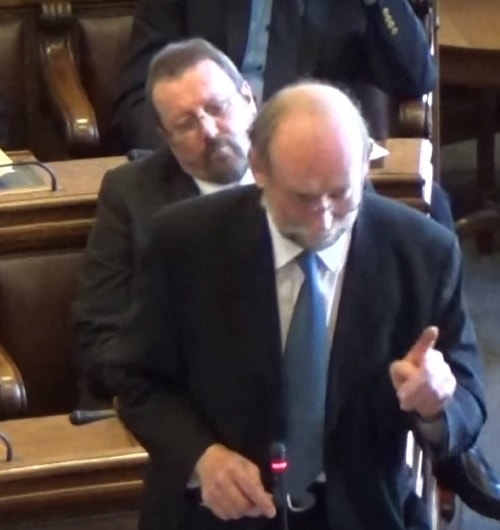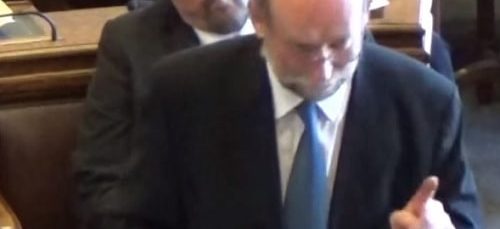Colette raised the issue of the NHS doing armchair exercise with a pensioner’s luncheon club, she said the NHS had only guaranteed to pay for the coach for a further nine weeks, after which they’d have to pay. She said the existing coach was very good and that Arrowe Park Hospital were referring people to them.
In response to a question Colette clarified that the coach was a person and not a transport issue. It was pointed out that a decision over the Area Forum funds wouldn’t be made until October.
Michelle Gray pointed out that the St James Centre also had funding for community projects.
Donnie asked if the £83,000 included Your Wirral funds?
Michelle Gray said no as that was dealt with by regeneration and Wirral Partnership Homes.
John Cocker suggested they could put the existing IT suites in the community centres to better use, but that they needed someone to run it.
Michelle Gray encouraged them to apply for the participatory budget funding.
Colette asked the police to investigate cars braking harshly in the early hours of the morning in Grange Road West. She said there had been drug activity and a recent stabbing there.
I asked the police about what had been done about antisocial behaviour around the Tollemache Road play area. Inspector McGregor said they had had more patrols in the area.
Inspector McGregor said they had monthly meetings with their partners and concentrated on hotspots. He referred people to the handout and said there had been a reduction in crime. Three lads had been arrested which had led to a drop in crime. Joy riding of vehicles on Bidston Hill and Bidston Moss was still a problem, but they now had a quad bike to patrol and were working to engage the young people in positive activities. This was aimed not just at those that had got into trouble, but also as a reward for good behaviour.
Colette said she used to go to neighbourhood action group meetings, but these had stopped. Inspector McGregor said they’d been replaced by Have Your Say meetings, as well as an emailed newsletter that went out to 3,000 on the mailing list.
Paul Murphy of Merseyside Fire and Rescue Service explained that the main fire station in Birkenhead would soon be demolished and rebuilt over the next year under a PFI scheme. He provided statistics on different categories of fires and home fire safety checks done. He asked those present to identify vulnerable residents and to tell the fire service about them via the free phone number so a Home Fire Safety Check could be carried out. There had been a reduction in deliberate secondary fires. They were aiming for a target to reduce smoking which was the cause of some fires in this area.
Leonora asked about tyres dumped on Bidston Hill and about these had been set on fire before they were removed. What could be done to stop dumping of tyres here?
Paul Murphy said it was partly seasonal, as children were more likely to light fires in the holidays. They had received training as to where the hydrants were and trained the Community Patrol. He felt that the removal of flytipping was an issue for Wirral Council.
A member of the public asked where the fire service would be operating from while the building was rebuilt?
Paul Murphy said there would be temporary accommodation while it was constructed.
A member of the public asked what would happen if the building work overran?
Paul Murphy said that there were penalty clauses in the contract and that other PFI contracts had been finished on time.
Community Safety gave an update encouraging new Neighbourhood Watch schemes, there was also a new Birkenhead Park Watch. He also said they now had a more robust reporting mechanism for disability hate crime which involved the safeguarding team at the Department for Adult Social Services and the Sigma team at Merseyside Police.
There was a camera monitoring Tapestry Gardens and one monitoring the new Asda, although levels of antisocial behaviour there had not been above the normal level they expect. The limited resources they had such as the Contactabus had gone to a hotspot in another part of the Wirral.
Cllr Harry Smith asked if Neighbourhood Watch scheme stickers were available. Ian Lowrie said they were and they were trying to link the Neighbourhood Watch scheme areas to No Cold Calling Zones.
Donnie advised against residential properties displaying the stickers as they could become targets for crime, but suggested lamp posts instead.
Ian Lowrie said that in the No Cold Calling Zones there would be signs at either end of the street to advise traders.
Laura Quigley gave an update on the changes affecting the GP Commissioning Groups. From April 2013, they instead of the PCT would commission services. There were sixty-one GP practices in three groups on the Wirral, there were patient groups at each GP that patients could contact or they could raise matters with their GP. It didn’t involve privatisation and healthcare would still be free at the point of delivery.
A member of the public asked if it would lead to a postcode lottery?
The answer given was that the big things such as Arrowe Park hospital services would be commissioned together.
The Chair asked what would happen next.
Laura Quigley answered that before they commissioned any services they had to be authorised which was a rigorous process. They would find out in January 2013 if they were, if not a NHS Commissioning Board would commission services.
A member of the public said the three groups had similar names, would they be commissioning the same sort of services and what was the logic in having three?
Laura Quigley answered that they had been formed in isolation, however they would commission some services together.
Colette asked how this would affect hospital services.
Laura Quigley replied that there wouldn’t be a change as the yearly contract would be made on behalf of all three groups for emergency and elective care.
The issue of the vascular services review was brought up by Colette. The Chair said there had been public consultation and public meetings.
A member of the public brought up speeding in the morning in Wexford Way and asked for traffic calming. Another member of the public asked for Buttermere Avenue to be resurfaced as there were many potholes. Someone else asked if the double yellow lines outside shops were reviewed as many shops were closing. Cllr Harry Smith suggested people contact Streetscene about it.
53.402022-3.070415

